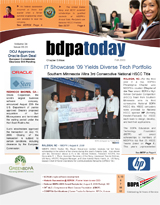|
|
|
bdpatoday
Volume 31 | 10.06.09 |
|
|
|
|
|
bdpatoday blogs, discussions, and
event calendars are enhanced by

2009 Annual Awards Banquet | NOV 12
Reserve tables or tickets today. RSVP on or before October 31.
bdpatoday | online
Missed one? In case we missed you yesterday, our newsletter archives and Acronym of the Day are updated each week for new sponsors, BDPA chapter interest groups (CIGs) and new BDPA members up to the last 100 online editions. Discover more...
Federal Register goes XML -- at last (Improves grant visibility and content customization)
White House open government initiative helps produce new version of Federal Register.
bdpatoday-- Federal Computer Week (FCW) reports the Federal Register is now available in a format that lets readers browse, reorganize, and electronically customize the publication's daily contents, White House officials announced today. Issues of the Federal Register are now available at Data.gov and GPO.gov in the XML format, according to the White House. XML is a machine readable form of text that can be manipulated to work with digital applications making so people can access and analyze its contents in custom ways. The Government Printing Office and the National Archives and Records Administration collaborated with the White House open government initiative to produce the new version, White House officials said.
Read more...
BDPA & Government Relations:
|


XML
XML (Extensible Markup Language) is a flexible way to create common information formats and share both the format and the data on the World Wide Web, intranets, and elsewhere. For example, computer makers might agree on a standard or common way to describe the information about a computer product (processor speed, memory size, and so forth) and then describe the product information format with XML. Such a standard way of describing data would enable a user to send an intelligent agent (a program) to each computer maker's Web site, gather data, and then make a valid comparison. XML can be used by any individual or group of individuals or companies that wants to share information in a consistent way.
XML, a formal recommendation from the World Wide Web Consortium (W3C), is similar to the language of today's Web pages, the Hypertext Markup Language (HTML). Both XML and HTML contain markup symbols to describe the contents of a page or file. HTML, however, describes the content of a Web page (mainly text and graphic images) only in terms of how it is to be displayed and interacted with. For example, the letter "p" placed within markup tags starts a new paragraph. XML describes the content in terms of what data is being described. For example, the word "phonenum" placed within markup tags could indicate that the data that followed was a phone number. This means that an XML file can be processed purely as data by a program or it can be stored with similar data on another computer or, like an HTML file, that it can be displayed. For example, depending on how the application in the receiving computer wanted to handle the phone number, it could be stored, displayed, or dialed.
XML is "extensible" because, unlike HTML, the markup symbols are unlimited and self-defining.
______________________
Source:
Tech Target
|
|
|
|
|
|
|
|
|
2009 Annual Scholarship & Awards Banquet
November 12, 6-9 PM
Washington Navy Yard
Conference Center
Keynote: Cynthia Miller
|
NROTC Scholarships
now on deck @ BDPA!
Cover story in bdpatoday
|
FALL 2009 Print Edition
Download versions available 
|
|
|
|
|
|
About BDPA-DC
NBDPA's Washington, D.C. Chapter was founded in 1978 by Norman Mays. It was incorporated in 1981 as a domestic not-for-profit corporation in the District of Columbia. In February of 1988, Black Data Processing Associates of Washington, D.C. Metropolitan Area (BDPA-DC) became an IRS Section 501(c)(3) Public Charity. Today, BDPA-DC provides professional development services for its members and stakeholders in direct support of local and regional STEM (Science. Technology. Engineering. Math) initiatives. Towards this end, BDPA-DC partners with BDPA Baltimore, BDPA Northern Virginia, and BDPA Richmond to support members and stakeholders within the National Capital Region (NCR) and the Baltimore-Richmond Corridor. BDPA-DC also serves NBDPA, BDPA Chapters and Chapter Interest Groups (CIGs) as a federal news bureau, government relations liaison, and bdpatoday newsletter clearinghouse for emerging NBDPA Chapters.
BDPA-DC
611 Pennsylvania Avenue, S.E., Suite 213
Washington, District of Columbia 20003, USA
|
| Select here to join, sign-up a co-worker, or renew memberships | |
|
bdpatoday ISSN 1946-1429 is published by BDPA-DC and participating NBDPA Chapters.
| |
|